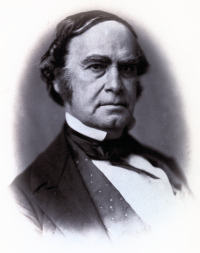H R Washington Jany 9. 1861
My dear Wife
Your letter of the 2d and one from Goodi– on the subject of changing our household arrangements were received last night. I am inclined to think we had better give up housekeeping, some time soon, but I dislike to do so without some further reflection: for I have a longing anxiety to unite our dear family with you at our quiet fireside in March and if then the troublesome times permit, allow us a few weeks or months of family home enjoyment.
I will not precipitate a determination. We need not be in great haste. I presume Goodrill [?] will not be required to move hastily.
Although things look quite cheerless in many respects, we are not in desparate straits just yet and we need not be in great haste.
Goodril proposes that he take the house and in consideration board you and Carrie. This does not seem to me a safe arrangement for us. You may or may not desire to remain there. If I am to be here most of the time to attend called cessions as now seems probable you would probably prefer to be nearer to me and I should prefer to have you. I would of course prefer that Goodril should have the house and furniture, but is he so settled now as to feel certain he will remain in Keokuk. Hard times are down on all of us and we must arrange our domacils to suit the revolutionary times that now seems to embarrass all matters of business and may influence the peace and quiet of different localities.
We have got through the Committee of 331 and the Chairman Mr. Corwin2 is now writing out his report. Our recommendations are only explanatory of our views of Southern rights under the Constitution with provisions to give a little more clearness to matters in controversy.
Mr. Adams’ proposition to admit New Mexico as a State is the only important matter.3
It would stifle the question about territory as this is all there is South of 36.30 The disunionists will of course refuse everything; but we want [to] deprive them of every ground of complaint and then let them stand clearly on persistent wrong. In the Caucus and among republicans I have opposed this because I preferred a general organization of the territories as incohate states which would in my judgment settle the matter and organize all necessary territories. But Mr Adams does not by his propositions violate our platform and if it tends to peace or tend to expose the obstancy of the revolutionists I am willing to go with those who must take some responsibility in their support of the chairman and Mr Adams.
We are in momentary anxiety to hear from Charleston where it is said troops and provisions have been sent to the relief of Major Anderson.4 As I said to you in a former letter, I do not care now how much S Carolina displays her quo animo it will rally the entire North to the resentment of insults and outrages already committed. My resolutions favoring the use of force were defeated in the Committee of 33 by a substitute introduced by Mr Dunn of Indiana–5 There is still a hope existing among some that we may avoid blood. I consider it impossible and therefor the sooner the appeal to arms be made the less extended will be the conflict and the sooner we may hope to see peace.
Nat Sturges is hear boarding with us and is enjoying himself generally He seems [as] clever and kind as ever and has some hope of securing some office under the incoming administration.
Last night we called on Miss Juliana May her mother and sister where we had a feast of music and very agreeable visit.
After that I went with the Mr Pennyman6 and made a call at the Speakers.7 Miss May gives a concert Thursday even’g for the benefit of some persons who sustain losses by a fire that occurred last week.
Legislation is proceeding while I write. We are very quiet while the gathering storm of the South continues to threaten the entire country. Perhaps you had best show this to Goodril. I will write him soon Give my love to our folks. I will answer Laiffe and brother Hosmer very soon.
Affectionately yours
Sam. R. Curtis
1. The Committee of Thirty-three was appointed December 6, 1860, upon motion of Boteler of Virginia. Curtis was appointed the member of the Committee from Iowa. Majority reports of the committee were filed January 14, and the minority January 16. A consideration of the same was made a special order of the day for Monday, January 21. No formal action of the House was had, however. Its purpose was to consider the proposals of compromise which might avert secession. Tension was so high, and tempers and mind so determined, that several members refused to serve on the Committee, stating they knew they could accept no compromise. See the Congressional Globe 36th Congress, 1st session, for appropriate dates.
2. Thomas Corwin, Whig and Republican leader of Ohio served in both branches of the national legislature. In 1861 he was completing his last term as a Representative before taking duties under the new administration as minister to Mexico.
3.See Congressional Globe for references to New Mexico being admitted as a state.
4. Major Robert Anderson, West Point graduate, Southerner by birth and antecedents, assigned to protect Charleston Harbor in 1860, was an unintentional hero of Fort Sumter. An earnest soldier he adhered to the Union cause in the war that followed.
5. William McKee Dunn, representative from Indiana 1859-1863, later rose to become Judge Advocate General in the U. S. Army.
6. William Pennyman, Governor of New Jersey 1837-1843, Whig member of Congress but one term, 1859-1861, was elected Speaker for that term, one in which much contention with the Chair was inevitable.
7. William Pennyman
